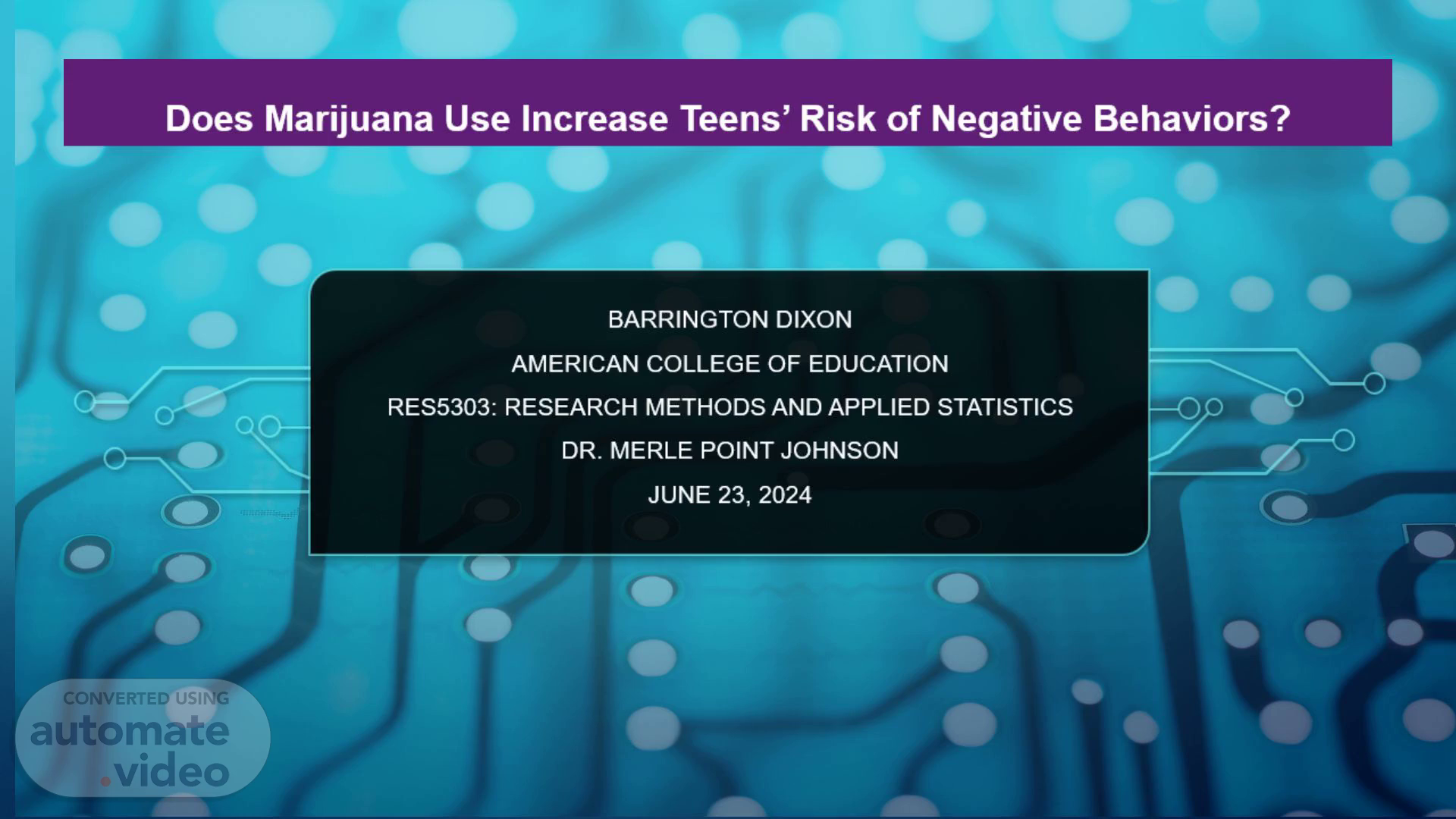
Page 1 (0s)
[Audio] Does Marijuana Use Increase Teens' Risk of Negative Behaviors?.
Page 2 (12s)
[Audio] Teens' rapidly developing brains are vulnerable to marijuana's effects. Despite changing public perception, concerns linger about its impact on young minds. This is especially important as teen marijuana use rises, with nearly 40% of high school seniors reporting past-year use. Teen marijuana use worries professionals due to links with mental health problems (depression, anxiety, psychosis), academic decline (memory, focus, grades), addiction, and risky behavior (accidents, sex, law). Understanding these harms helps professionals guide teens..
Page 3 (49s)
[Audio] The problem to be addressed in this proposal is the increase of poor decision-making among teens between the ages 14 and 18 who regularly smoke marijuana. It identifies a link between teen marijuana use and poor decision-making, which decisions are impacted (academic, risky behavior etc.) and acknowledging other potential contributing factors..
Page 4 (1m 14s)
[Audio] The research questions guiding this study are: What is the relationship between the frequency and intensity of marijuana use and the development of negative behaviors in teenagers? How do social factors influence the risk of negative behaviors in teens who use marijuana compared to those who don't?.
Page 5 (1m 32s)
[Audio] The following are key themes ascertained from the literature review conducted: Effects of Marijuana on the Developing Brain THC in marijuana might hinder brain development, leading to issues like memory problems, risky behavior due to impulsiveness, and prioritizing instant gratification. Increased Risk-Taking Studies have shown a link between adolescent marijuana use and risky behaviors, including increased likelihood of unprotected sex due to impaired decision-making, experimentation with other drugs, and traffic accidents caused by impaired coordination and reaction time..
Page 6 (2m 10s)
[Audio] Frequency and Intensity Use of Marijuana Teen marijuana use (frequency and intensity) may be linked to negative behaviors (mental health, school, risky acts) [American Academy of Child and Adolescent Psychiatry, n.d.]. Cause and effect unclear; teens with existing issues might be more prone to use. Social Factors Teens with peer pressure (friends who use) or weak parental controls are more likely to use marijuana. Social isolation and mental health issues can also lead teens to use it to cope, but this can make things worse in the long run. Marijuana use is linked to lower grades and increased mental health problems..
Page 7 (2m 51s)
[Audio] Data Collection and Analysis To gain a comprehensive understanding of this issue, the researcher will employ a multi-method approach that combines quantitative and qualitative data collection techniques. This study will utilize two complementary methods: cross-sectional surveys and focus groups, along with analytical methods such as descriptive statistics and thematic analyses to better understand data gathered..
Page 8 (3m 15s)
[Audio] Overall, the design uses a multi-method approach with a well-defined target population and diverse recruitment strategies. The data collection instruments are designed to be anonymous and comprehensive, and the data analysis plan utilizes appropriate methods for both quantitative and qualitative data. This approach is likely to yield valuable insights into the relationship between marijuana use and risky behaviors among teenagers...
Page 9 (3m 44s)
[Audio] Quantitative Data • Increased risk of mental health issues: A longitudinal study of over 100 teens found that those who began using marijuana before age 18 were more likely to experience depression and anxiety in young adulthood compared to non-users. • Cognitive decline: Studies using memory and learning tests show a negative association with frequent marijuana use in teens, suggesting poorer academic performance. • Risky behaviors: The surveys revealed teens reporting a higher prevalence of delinquency, school absences, and unsafe sexual activity among those who use marijuana compared to non-users..
Page 10 (4m 25s)
[Audio] Qualitative Data • Interviews with teens who use marijuana: Reveal motivations for use often linked to coping with stress, anxiety, or peer pressure. These interviews offered insights into the self-medication for mental health issues that contributed to the cycle of use. • Focus groups with parents and teachers: Highlighted concerns about changes in behavior in teens who use marijuana, such as decreased motivation, difficulty concentrating, and engaging in risky activities..
Page 11 (4m 56s)
[Audio] The findings from this study can help us understand the relationship between marijuana use and risky behaviors among teenagers. This information can be used to develop prevention and intervention programs to help teens make healthy choices. However, research on marijuana and teen behavior is ongoing. The specific effects of marijuana use can vary depending on factors like frequency, potency, and the individual's unique biology and mental state..
Page 12 (5m 24s)
close up of circuit board. References. Agrawal, A., Lynskey, M. T., & Bradshaw, P. (2021). Adolescent cannabis use and the risk of later substance use disorders: A systematic review and meta analysis. Addiction, 116(4), 881-901. American Psychological Association. (2014, August 4). Regular marijuana use bad for teens' brains [Press release]. apa.org American Psychological Association. (2020). Publication Manual of the American Psychological Association (7th ed.). https://apastyle.apa.org/ Chen, C. Y., Brook, J. S., Whiteman, R. N., Xu, X., & Read, T. P. (2020). Association of adolescent cannabis use with sexual risk behaviors in young adulthood: A longitudinal study. Drug and Alcohol Dependence, 209, 108082. Johnston, L. D., Bachman, J. G., Schulenberg, J. E., & Monitoring the Future Research Team. (2023). Monitoring the future national survey on drugs, tobacco, and health: High school seniors and college freshmen (monitoring the future occasional paper no. 148). University of Michigan, Institute for Social Research. Volkow, N. D., Dursun, S., & Moeller, J. (2016). Adolescent marijuana use and addiction**. The New England Journal of Medicine**, 374(23), 2272-2280..